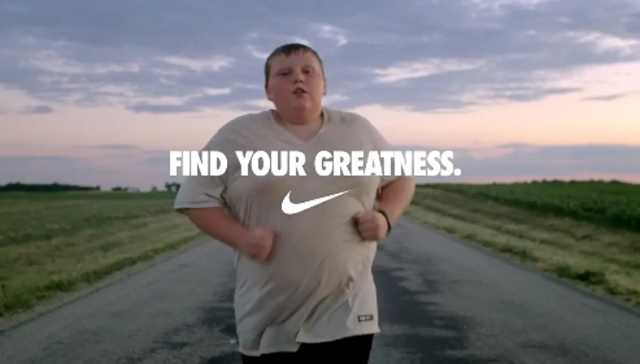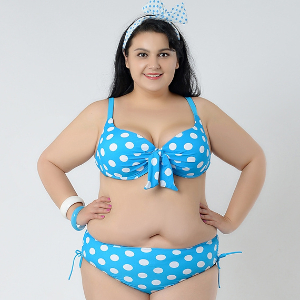Okay. Here goes nothing. I feel compelled to reprise the issue of the media’s recent untrumpeted move to normalize fat. Actually, they’ve started marketing aggressively to fat people, and fat folks are showing up in droves in new TV and online ads – sending a dangerous message…
 Nike recently started featuring ‘a new kind of athlete’ in its ads. But if this
Nike recently started featuring ‘a new kind of athlete’ in its ads. But if this
fat kid keeps up the effort, he’ll soon be a fitter, healthier, happier
conventional athlete. Fat is NOT good. Fat does NOT work…
I wrote in this space, back on March 1 of this year, that it appears the media are quietly changing their long-established practice of populating their commercials with ‘perfect’ people – fashion-model women and gym-pumped men – as examples of how great you can be if you just use the product or service they’re pushing. That creates unrealistic expectations for the vast majority of us, of course, but there’s no law against it (although maybe there should be).
Are you old enough to remember when the advertising industry first recognised the existence of people of colour as social pressure dictated that ‘token’ black actors began appearing in TV and print advertising. More recently, the number of Black, Asian, Middle Eastern, Hispanic, Native American and any other non-white group you could name have overtaken white actors in print and video ads. The tables have turned 180 degrees. It’s now ‘normal’ for mass market ads to feature ‘token white folks’.
I’m not complaining. The new trend brings the balance of people of colour to white representation in line with reality. I read a dew decades ago that white folks would, by this time in history, be the new minority. We are. And more recently, that enlightened free intermarriage between races would render the entire population a uniform shade of light brown by the end of this century. I won’t be around to see. And frankly, madame, I don’t give a damn. I just hope humanity – in whatever form or colour – is still around when 2100 rolls around. The depredations of global warming are already getting pretty serious, and there are still 78 years to go.
Normalizing another human dimension
Most recently, I’ve noticed that the mass marketing ads have been featuring fat people. Not just a token representative here and there, but multiple overweight and obese actors suddenly popping up all over the place. Health and wellness advocates, government agencies, and the medical community have been harping away on the epidemic proportions of the obesity crisis for almost a decade now. Latest official estimates say almost 75 percent – 3 out of 4 – Americans are now overweight or dangerously obese. That’s a market segment numbering just shy of 250 million hungry souls. How could the advertising industry have overlooked this opportunity for so long?
The flip side
According to Wikipedia, “Compared to non-obese Americans, obese Americans incur an average of $1,429 more in medical expenses annually, and the obese American population spends approximately $147 billion per year in added medical expenses. However, some evidence suggests the lifetime cost of medical treatment for obese individuals is lower than for healthy weight individuals.” But that’s because fat people die sooner. Some, much sooner – of a wide variety of conditions and diseases including cardiac issues, type 2 diabetes, some cancers and myriad metabolic disorders.
But that doesn’t seem to bother the advertising geniuses. They liberally populate their latest creations with happy, active fat people who are depicted as enjoying life to the fullest. That does NOT reflect reality.
The overarching message is, ‘It’s alright to be fat’. To paraphrase financial bad guy Gordon Gekko in Wall Street: “Fat is good! Fat works!”
Well, fat is clearly NOT good, and it DOESN’T work. That’s my message.
To my critics…
As you might imagine, I’ve had my share of knee-jerk, freaking-out, downright nasty comments from fat people. I’ve been accused of fat shaming, of suggesting, “fat people should be excluded from public life ‘for their own good’, a.k.a. textbook concern trolling,” and asked , “What kind of uncivilized hole do [I] live in?” None of that bothers me. I’ve been around enough to know that anyone who offers an opinion in a public forum must be prepared for feedback – both positive and negative. And that you can’t take any of it to heart.
But taking the whole issue to heart is just what a lot of folks do when they see themselves being attacked. I can well imagine that some (many?) overweight and obese people would feel backed into a corner by any article that criticises their condition. The result is a lot of anger, vitriol and fear-generated striking back. I take heart in the knowledge that, the more disjointed, rhetorical, and unreasoned a criticism is, the less seriously I need to take it.
I also note, with some satisfaction, that no hateful nay-sayer has addressed the key points of my essay: That fat causes illness and shortens lives. And costs society a huge amount of money that could be spent to greater positive effect in other economic theatres.
Fat and proud?
I’ll never understand the ‘Fat Rights’ people. But to be fair, I’ll spotlight and recommend the book Fat and Proud (1998) by Charlotte Cooper, widely considered the founding declaration of the movement.
The official Google description of the tome says, “[A]ctivist Charlotte Cooper charts the evolution of the fat rights movement. Demonstrating the extent of ‘fatphobia’ in society, she explains not only how it affects fat women, but how the fear of being fat oppresses all women. She also looks at health issues, challenging the ‘medicalization’ of fat people and exposing the myths and dangers of dieting and thinness. Throughout are the voices of fat women relating their experiences of discrimination and pain — but also their affirmations of positive self-image and esteem. Fat and Proud represents a coming to power of the fat rights movement; it calls for a greater appreciation of body-size diversity, so that all of us might live in and enjoy our bodies without fear or shame.”
Alas, it’s not a matter of enjoying their bodies without fear or shame. Fat is about illness, shortened lives, and a huge economic burden on society. And as earnestly as Cooper’s theory is presented, I know no fat people who are happy or proud. It’s a big, fat rationalization of a lifestyle driven by self-indulgence and self pity, espoused by folks who can’t be bothered to cure their illness, even if it would mean they enjoyed longer, healthier lives. And even if it does cost everyone in society – not just the fatties themselves – an unconscionable amount of money.
Muse on that…
~ Maggie J.

